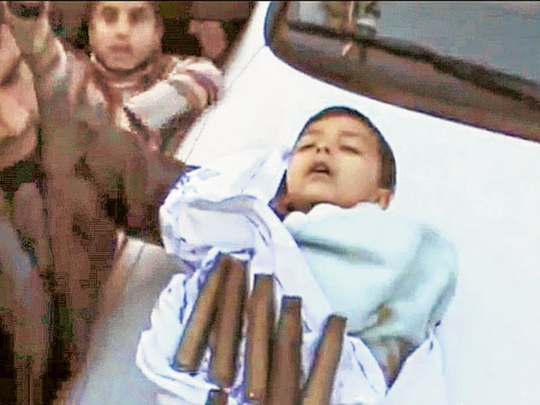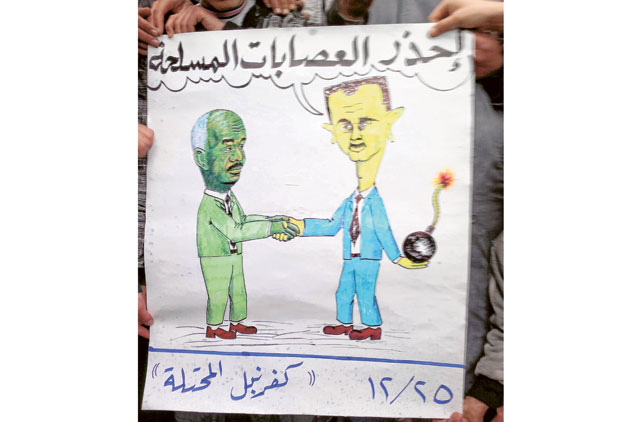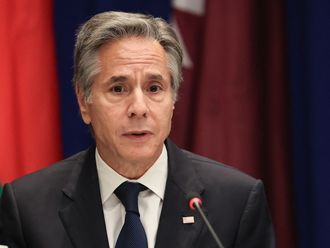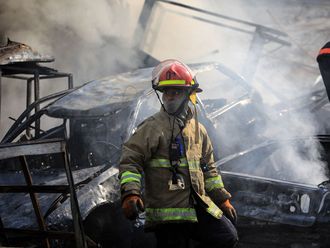
Beirut: Ten months into Syria's unrest, those who know President Bashar Al Assad say there's good reason he has outlasted other leaders threatened by the Arab Spring uprisings: stone-hearted detachment.
This trait was evident to the public when the Syrian president broke his silence and gave an interview to ABC News, broadcast December 7, in which he refused to accept responsibility for the violence, according to a former friend, Abdul Nour, who first met Al Assad as a college student in 1984.
Al Assad "lives in a cocoon" and opts not to see the reports of torture and killings alleged to have occurred since mid-March, when the protests began, Abdul Nour said in an interview. "He wants to deal with things with a cool mind," he said.
As the death toll in Syria passed 5,000, according to United Nations estimates, the international community is increasing economic and political pressure on Al Assad's government while showing support for the opposition. Amid this growing isolation, Al Assad's demeanour during the interview has prompted Western officials to question the extent to which he is in control and how long he can last.
David W. Lesch, who wrote a biography of the president's late father, Hafez Al Assad, says evidence suggests that forces other than Al Assad — including members of the Mukhabarat, the dozen branches of Syria's security and intelligence agencies — are making decisions about the harshness of the violence.
"Power at the top in Syria is compartmentalised," Lesch said in an emailed response to questions. "While Bashar is certainly in control and ultimately responsible for all actions by the government, there are fiefdoms of power that react convulsively when their area of authority is activated."
Lesch said he caught a glimpse of this when he was detained in 2007 during a visit to Damascus to meet the president.
In father's footsteps
"I basically told him that he needs to get more control over the Mukhabarat, because it would could come back to haunt him," Lesch said.
The current crackdown is reminiscent of Hafez Al Assad's repression of dissenters in 1982, when Al Assad was graduating from high school and about to embark on his university studies and a medical degree. Then, his brother Bassel was the heir.
After Bassel was killed in a car crash in 1994, Al Assad disappeared for more than a year. Upon his return, Abdul Nour said, the shy, pleasant, even delicate man he had known at Damascus University had begun lifting weights and had undergone the first phase of a radical personality change.
"He became more confident, daring, an assertive military man," Abdul Nour, a media and public policy consultant, 47, said in a phone interview. "After he became president, when people showered him with compliments and inflated his ego, he became totally different."
Robert Danin of the Council on Foreign Relations in Washington, who met Al Assad in 2003 and 2004, said that in both those meetings the president "displayed uncanny patience when confronted with allegations of his regime's utter brutality."
Incident
"Most people would push back strongly to charges of murder, torture and state-sponsored terrorism, but Al Assad's responses were calm, deliberate and mild, as if he had just been asked why he doesn't pay his parking tickets," Danin said.
Abdul Nour recalled an incident in 2000, shortly after Al Assad succeeded his father as president, involving a child who had been painfully injured and needed medical attention.
Abdul Nour, who ended his friendship with Al Assad in 2004, said he told the Syrian leader that the sight of the child in pain had made him want to cry.
"He got angry" Abdul Nour said. "It was forbidden to talk about anything emotional while with him. He said he was the president and can't take decisions based on emotions and has to be cold, calculated and detached."













